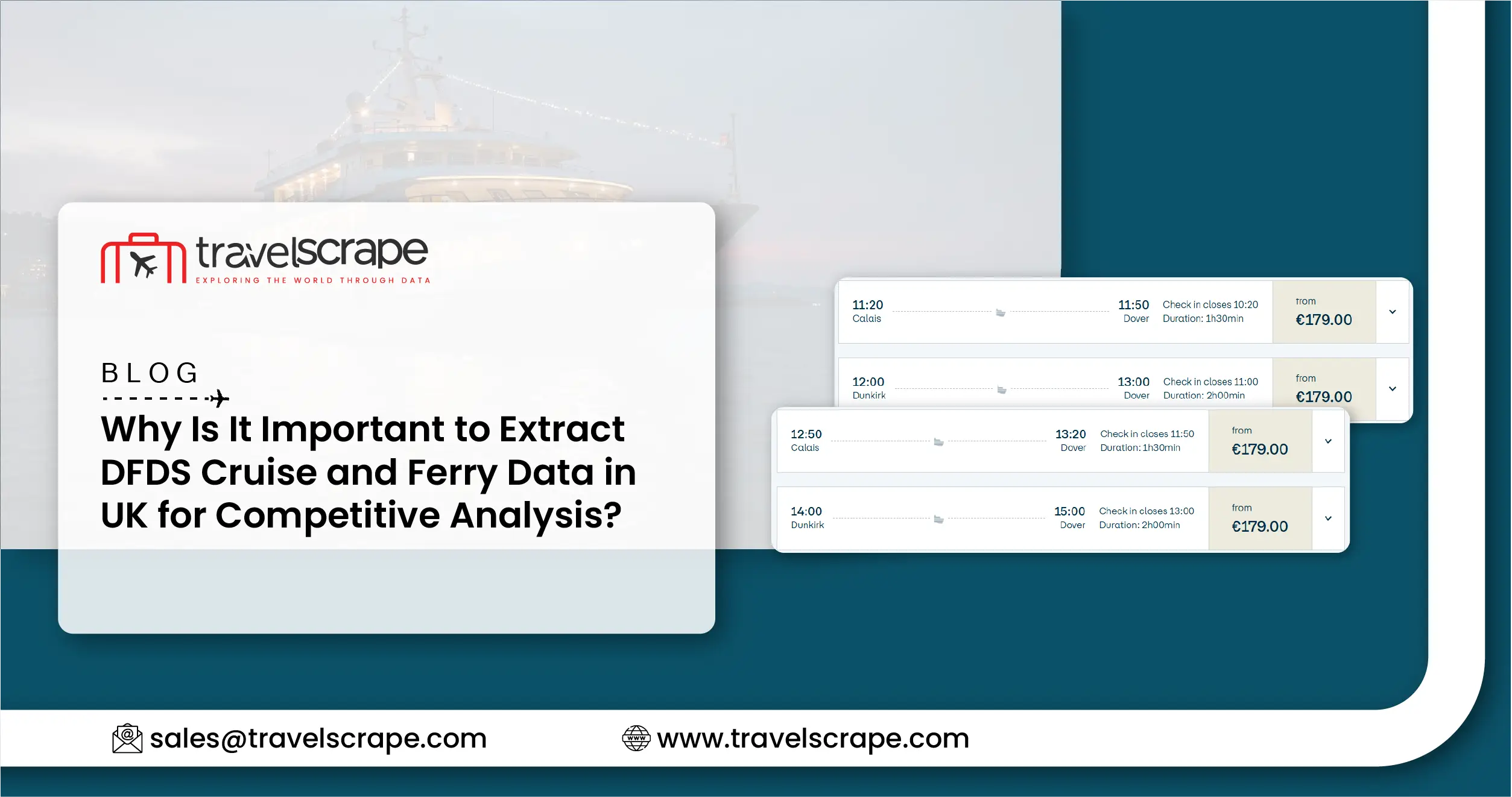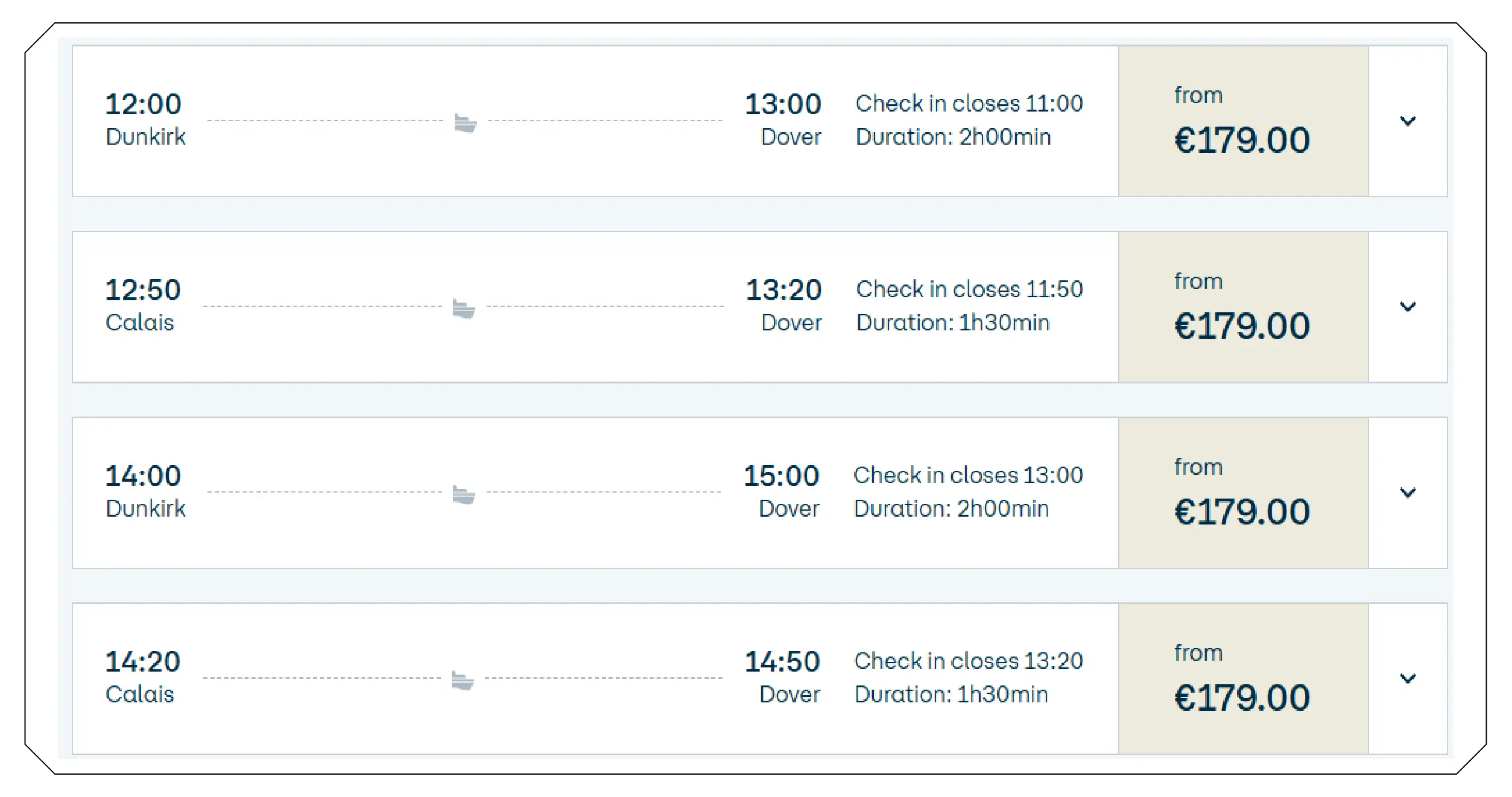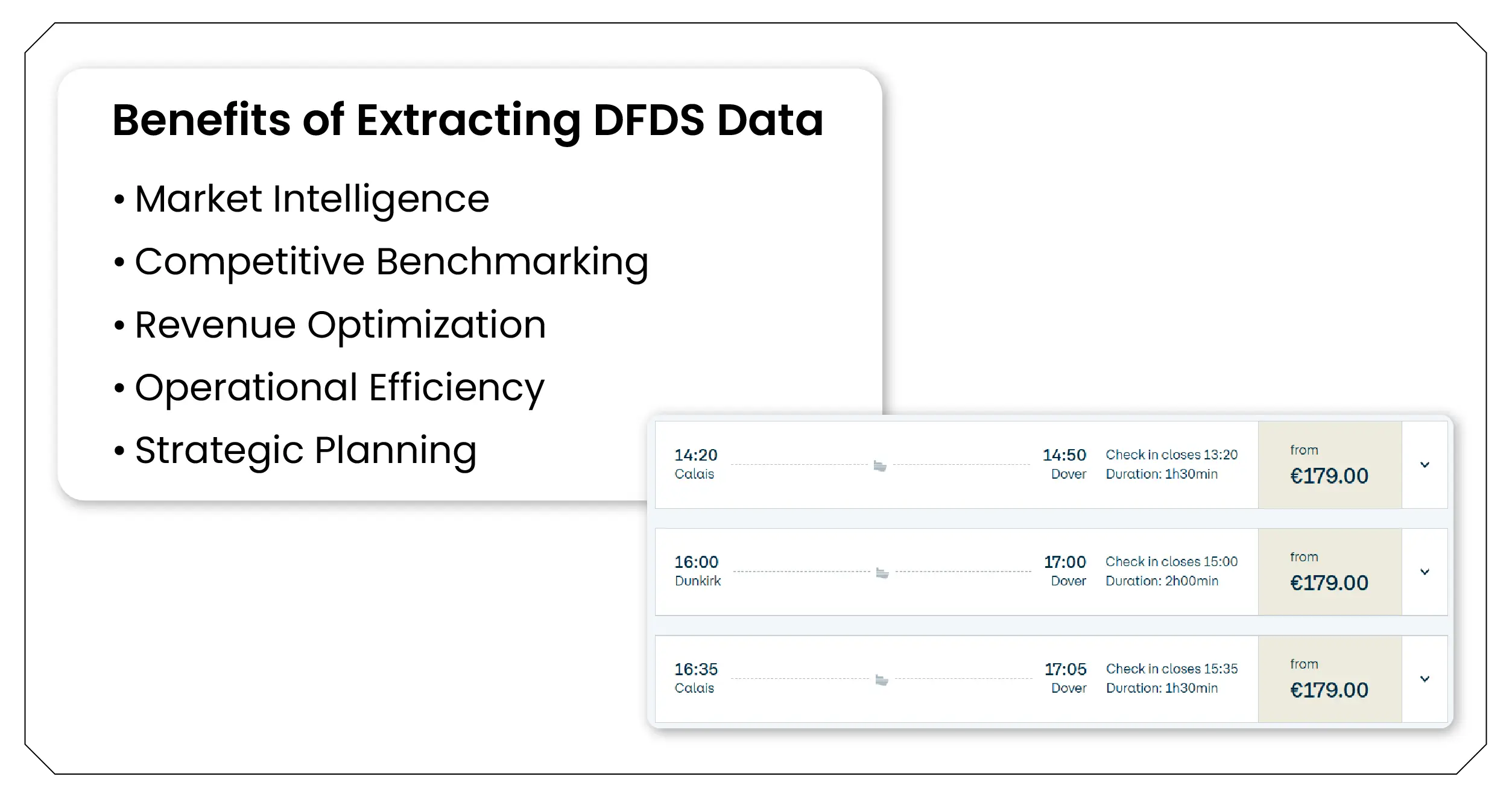Why Is It Important to Extract DFDS Cruise and Ferry Data in UK for Competitive Analysis?

Introduction
The UK cruise and ferry sector has experienced remarkable growth over the last decade, with DFDS establishing itself as a leading operator, offering both passenger and freight services across major domestic and international routes. As the market becomes increasingly competitive, it is crucial for travel agencies, tour operators, and market analysts to have up-to-date information on DFDS operations to make informed and strategic business decisions. Extract DFDS cruise and ferry data in UK to provide businesses with the ability to gather comprehensive, real-time insights into schedules, routes, pricing structures, and availability, which is invaluable for identifying trends and gaining a competitive advantage.
With the development of advanced data extraction tools, DFDS Cruise And Ferries Data Scraping has emerged as a critical method for monitoring market dynamics. Automated scraping solutions enable businesses to efficiently track itinerary changes, promotional campaigns, and booking patterns. These datasets allow companies to anticipate customer demand, optimize pricing strategies, and benchmark against competitors, ensuring they stay ahead in the dynamic UK cruise and ferry market. The integration of structured, real-time data also supports operational planning, revenue forecasting, and strategic marketing initiatives.
Why DFDS Data Extraction is Essential?

DFDS operates several key routes across the UK, connecting major ports such as Dover, Newcastle, and Harwich to destinations in continental Europe. Understanding the nuances of these routes, seasonal variations in demand, and pricing patterns is vital for businesses looking to optimize offerings or provide competitive travel packages. Extract DFDS UK Cruise & Ferry Data for Competitive Analysis to collect structured datasets on passenger capacities, ferry schedules, route performance, and real-time pricing information.
By gathering this information, businesses can:
- Benchmark performance against competitors.
- Analyze seasonal demand fluctuations.
- Optimize pricing and promotional strategies.
- Forecast customer preferences and travel trends.
Key Data Points Captured
When performing DFDS data extraction, several critical parameters can be tracked. A comprehensive DFDS Cruise Itineraries Dataset includes:
- Route Details: Ports of departure and arrival, intermediate stops, and travel duration.
- Pricing Information: Standard fares, promotional deals, and cabin categories.
- Schedules: Departure and arrival times, seasonal adjustments, and frequency of trips.
- Customer Reviews and Ratings: Passenger feedback on comfort, amenities, and service quality.
- Booking Availability: Real-time seat and cabin availability for accurate forecasting.
Collecting and structuring this data ensures that businesses can derive actionable insights for operational planning and market positioning.
Methodologies for Scraping DFDS Data
Modern web scraping techniques enable businesses to automate the extraction of DFDS data efficiently. Scraping DFDS Cruise & Ferry Routes in UK for Market Insights involves using a combination of Python scripts, APIs, and browser automation tools. Key methodologies include:
- HTML Parsing and DOM Analysis: Extracting route and schedule information directly from the DFDS website or partner booking portals.
- API Integration: Leveraging official or third-party APIs to access structured data such as pricing and availability.
- Dynamic Content Handling: Using tools to handle JavaScript-rendered pages and interactive elements on booking platforms.
- Data Cleaning and Structuring: Transforming raw data into structured datasets suitable for analytics and reporting.
- Automation and Scheduling: Implementing cron jobs or automated workflows to collect data periodically, ensuring real-time updates.
Benefits of Extracting DFDS Data

The advantages of Global Cruise Route Dataset and DFDS-specific data scraping are manifold:
- Market Intelligence By extracting and analyzing DFDS cruise and ferry data, businesses gain a comprehensive understanding of high-demand routes, seasonal travel patterns, and passenger preferences. This insight enables companies to anticipate market trends, identify emerging opportunities, and tailor their services to meet evolving customer needs. Access to accurate, real-time data ensures that travel agencies, tour operators, and booking platforms can make decisions grounded in actionable intelligence rather than assumptions.
- Competitive Benchmarking Monitoring competitors’ itineraries, pricing models, promotions, and service expansions provides businesses with a clear picture of the competitive landscape. Companies can compare their offerings against industry benchmarks, identify gaps in services, and adopt strategies to differentiate themselves. Benchmarking ensures that businesses remain competitive while aligning pricing, promotions, and route planning with market realities.
- Revenue Optimization Real-time insights into availability, demand fluctuations, and seasonal trends allow businesses to optimize pricing dynamically. By adjusting fares, discounts, and package offerings based on live market data, companies can maximize revenue, improve occupancy rates, and ensure profitability even during low-demand periods.
- Operational Efficiency Automating data collection and processing reduces manual effort, minimizes errors, and ensures timely access to large volumes of structured data. Operational efficiency enables teams to focus on strategic initiatives, improve responsiveness to market changes, and streamline internal workflows across departments.
- Strategic Planning Structured datasets empower businesses to make informed strategic decisions, including targeted marketing campaigns, route expansion planning, and identifying partnership opportunities. By analyzing customer behavior, route performance, and competitor activities, companies can align long-term business strategies with market demand. Strategic planning ensures optimized resource allocation, improved market positioning, and sustainable growth in the competitive cruise and ferry industry.
Real-Time Pricing and Availability Monitoring
Travel agencies and booking platforms benefit significantly from tools to Extract Real-Time DFDS UK Cruise Pricing and Availability. Real-time monitoring allows businesses to respond to fluctuations in demand, optimize seat allocation, and design dynamic pricing models. This approach ensures that customers always receive accurate fare information, improving satisfaction and loyalty.
Similarly, maintaining access to the Web Scraping DFDS UK cruise deals and promotions enables travel businesses to stay competitive, adjust packages, and promote special offers that align with market trends.
Case Study: Leveraging DFDS Data for Travel Analytics
A leading UK-based travel aggregator wanted to improve its ferry and cruise offerings by analyzing DFDS services. Using Real-time DFDS UK Cruise & Ferry booking data analysis, our team developed automated scraping workflows that captured itineraries, pricing, seat availability, and customer feedback.
The structured data enabled the client to:
- Identify high-demand routes and seasonal trends.
- Monitor competitor promotions and pricing strategies.
- Optimize their booking platform to display the most competitive options.
- Enhance customer engagement by providing accurate, real-time information.
The result was a measurable increase in bookings, improved revenue management, and a strengthened market position.
Applications of DFDS Data Extraction
Businesses across the travel ecosystem can leverage DFDS data for multiple purposes:
- Travel Agencies: Curate competitive travel packages by monitoring routes, pricing, and promotions.
- Market Analysts: Perform trend analysis on customer preferences and route demand.
- Investment Firms: Identify profitable routes and expansion opportunities for strategic investments.
- Tour Operators: Optimize itineraries and create seasonal promotions aligned with demand patterns.
- Technology Providers: Integrate real-time DFDS data into mobile apps, dashboards, and booking platforms.
Tools and Technologies
Effective DFDS data extraction relies on robust technologies. Commonly used tools include:
- Python Libraries: BeautifulSoup, Scrapy, Selenium for web scraping.
- APIs: Access to structured data feeds for schedules and pricing.
- Data Storage: SQL and NoSQL databases for scalable dataset management.
- Analytics Platforms: Power BI, Tableau, or custom dashboards for visualizing insights.
- Automation Frameworks: Cron jobs and workflow schedulers for continuous real-time scraping.
These tools ensure accuracy, scalability, and timely delivery of actionable insights.
Challenges in DFDS Data Extraction
While DFDS data provides immense value, businesses face several challenges:
- Dynamic content and JavaScript-heavy booking pages.
- Anti-bot and security mechanisms preventing automated scraping.
- Large volumes of data requiring structured storage and efficient processing.
- Frequent changes in pricing, promotions, and availability.
- Integration of multiple datasets from diverse sources for comprehensive analysis.
Overcoming these challenges requires advanced scraping techniques and intelligent workflow automation.
Benefits for Travel Businesses
By leveraging DFDS data, travel businesses can gain:
- Enhanced Market Visibility: Track multiple routes, departures, and destinations in real-time.
- Pricing Intelligence: Monitor competitor fares and promotions to adjust offerings dynamically.
- Operational Efficiency: Reduce manual data collection efforts and improve accuracy.
- Customer Insights: Analyze booking patterns, preferences, and feedback to enhance service.
- Strategic Decision-Making: Use structured datasets for route expansion, seasonal promotions, and partnership planning.
Future Trends

The future of cruise and ferry data analytics is moving toward:
- AI-Powered Forecasting: Predicting demand fluctuations using historical DFDS datasets.
- Personalized Travel Packages: Leveraging customer insights from booking trends to offer tailored experiences.
- Mobile Integration: Providing real-time availability and booking options via apps.
- Dynamic Pricing Models: Automated adjustments based on real-time demand and competitor pricing.
By staying ahead in data intelligence, travel businesses can maximize revenue and improve customer satisfaction.
How Travel Scrape Can Help You?
- End-to-End Ferry Data Collection: We capture detailed information on ferry routes, departure times, ticket types, and seasonal schedules, giving businesses a complete market overview.
- Live Pricing & Availability Tracking: Our systems monitor real-time ticket availability, fare fluctuations, and promotional deals, enabling agile decision-making and dynamic pricing strategies.
- Actionable Insights Through Clean Data: Extracted ferry data is structured, de-duplicated, and formatted for easy integration into analytics platforms, dashboards, and business intelligence tools.
- Market & Competitor Intelligence: Businesses gain visibility into competitor offerings, service expansions, and route performance, supporting effective benchmarking and strategic planning.
- Automated, Scalable Scraping Solutions: Our technology ensures continuous extraction of large datasets, minimizing manual work while providing accurate, real-time insights for operational and commercial growth.
Conclusion
Extracting DFDS cruise and ferry data is no longer optional—it is essential for businesses seeking competitive advantage. Leveraging Cruise & Ferry Data Scraping Services, companies can monitor routes, pricing, availability, and promotions efficiently. Implementing Scraping DFDS Cruise & Ferry data in UK for travel analytics empowers businesses with actionable insights for strategic planning and market growth. Additionally, access to the Global Ferry Route Dataset ensures that companies can benchmark performance, forecast demand, and optimize operations. Ultimately, DFDS data extraction delivers measurable business value, reduces manual efforts, and provides a scalable solution for continuous monitoring in the UK cruise and ferry industry.
Ready to elevate your travel business with cutting-edge data insights? Scrape Aggregated Flight Fares to identify competitive rates and optimize your revenue strategies efficiently. Discover emerging opportunities with tools to Extract Travel Website Data, leveraging comprehensive data to forecast market shifts and enhance your service offerings. Real-Time Travel App Data Scraping Services helps stay ahead of competitors, gaining instant insights into bookings, promotions, and customer behavior across multiple platforms. Get in touch with Travel Scrape today to explore how our end-to-end data solutions can uncover new revenue streams, enhance your offerings, and strengthen your competitive edge in the travel market.